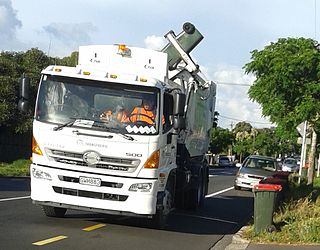The Dormant Commerce Clause, or Negative Commerce Clause, in American constitutional law, is a legal doctrine that courts in the United States have inferred from the Commerce Clause in Article I of the US Constitution. The Dormant Commerce Clause is used to prohibit state legislation that discriminates against interstate or international commerce.

A landfill site is a site for the disposal of waste materials by burial. Landfill is the oldest form of waste treatment, although the burial of the waste is modern; historically, refuse was simply left in piles or thrown into pits. Historically, landfills have been the most common method of organized waste disposal and remain so in many places around the world.
Landfills in the United Kingdom were historically the most commonly used option for waste disposal. Up until the 1980s, policies of successive governments had endorsed the "dilute and disperse" approach. Britain has since adopted the appropriate European legislation and landfill sites are generally operated as full containment facilities. However, many dilute and disperse sites remain throughout Britain.
A landfill tax or levy is a form of tax that is applied in some countries to increase the cost of landfill. The tax is typically levied in units of currency per unit of weight or volume. The tax is in addition to the overall cost of landfill and forms a proportion of the gate fee.
The Landfill Allowance Trading Scheme, LATS, is an initiative by the UK government, through DEFRA to help reduce the amount of biodegradable municipal waste (BMW) sent to landfill.

In 2015, 43.5% of the United Kingdom’s municipal waste was recycled, composted or broken down by anaerobic digestion. The majority of recycling undertaken in the United Kingdom is done by statutory authorities, although commercial and industrial waste is chiefly processed by private companies. Local Authorities are responsible for the collection of municipal waste and operate contracts which are usually kerbside collection schemes. The Household Waste Recycling Act 2003 required local authorities in England to provide every household with a separate collection of at least two types of recyclable materials by 2010. Recycling policy is devolved to the administrations of Scotland, Northern Ireland and Wales who set their own targets, but all statistics are reported to Eurostat.

The management of waste in New Zealand has become more regulated to reduce associated environmental issues.

Waste management laws govern the transport, treatment, storage, and disposal of all manner of waste, including municipal solid waste, hazardous waste, and nuclear waste, among many other types. Waste laws are generally designed to minimize or eliminate the uncontrolled dispersal of waste materials into the environment in a manner that may cause ecological or biological harm, and include laws designed to reduce the generation of waste and promote or mandate waste recycling. Regulatory efforts include identifying and categorizing waste types and mandating transport, treatment, storage, and disposal practices.
SUEZ Recycling and Recovery UK Ltd, formerly SITA UK Limited, is a British waste management company, established in 1988. It was previously called Sitaclean Technology. It began as a provider of local authority services, with its first municipal services contract in Erewash, Derbyshire in 1989. Suez has expanded its business through a combination of new contracts, joint venture partnerships and acquisitions.





